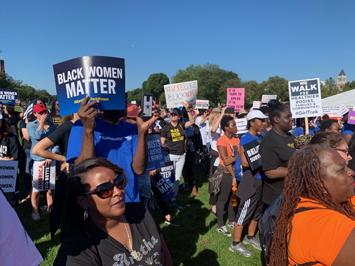Black women’s march brings hundreds to nation’s capital
By Nisa Islam Muhammad -Staff Writer- | Last updated: Oct 9, 2018 - 8:11:12 PMWhat's your opinion on this article?
WASHINGTON—Black women and their allies gathered at the National Mall in the nation’s capital for the March for Black Women to bring critical issues that concern them to the forefront and present these issues before the public in their own voices.

Black women and their allies gather at the National Mall for March for Black Women. Photos:Nisa Islam Muhammad
|
The concerns of Black women and girls are too often ignored or placed on the back burner of importance, they argued. Hundreds gathered for a press conference—young, old, Black, White, Latino, college students, D.C. residents and visitors, in support of the issues raised by the March for Black Women whose sponsors included: Black Women’s Blueprint, The D.C. Rape Crisis Center, and NESRI (National Economic and Social Rights Initiative).
Organizers presented several demands including: full re-authorization of the Violence Against Women Act which is set to expire Dec. 7 and pressing that political candidates focus on women’s concerns like poverty, affordable housing, reproductive rights and immigration protections.
The Sept. 30 march ended a riveting week of Judge Brett Kavanaugh’s Supreme Court confirmation hearing that featured Dr. Christine Blasey Ford’s testimony of allegations that he sexually assaulted her when she was 15.
Attorney Anita Hill sat in that same seat in 1991 when she accused then Supreme Court Justice nominee Clarence Thomas of sexual harassment during his confirmation hearing. She sent a statement to marchers.
“I believe you, I applaud your bravery and your strength. You are survivors and now you are mighty warriors. Together we will win the battle to keep ourselves and generations to come safe from sexual violence and sexual abuse,” said Atty. Hill.
“Today’s march is a giant, giant step in a world where we receive the respect that we deserve, in a world where we need, we must and we must demand and should receive the respect that we deserve,” she added.
Tarana Burke, civil rights activist and founder of the #MeToo Movement also addressed marchers via a live screen. “This is a moment for survivors of sexual violence of all stripes particularly Black women who are struggling to take a deep breath. We need to take a step back,” said Ms. Burke.
“We need each other in this moment. I’m so excited that so many of you turned out this morning. This is what the future looks like. We cannot depend on our leadership to lead us. We have to be an example of what leadership looks like. This is what leadership is. This is what leadership looks like. Forward ever, backwards never.
Renee Masterson came to the march with her mother and daughter. She told The Final Call, “I’m a survivor too. I understand the pain many of these women feel and want a better life for my daughter. My mother did the best she could and she’s here to support me. It was a long time before I could tell her what happened to me because I blamed myself for what someone else did to me.”
“Rape is never the victim’s fault. Never. We have to believe women. I didn’t think anyone would believe me or care. I had to make people listen and care. I took the hard steps to report my crime and now my rapist is behind bars. Thank God. That’s why I’m here to show support to other women to take the hard steps to stand up for themselves.”
For Sonya Wallace coming to the march was a chance to be part of history. She told The Final Call, “My grandparents came here for the March on Washington. This is my ‘March for Women.’ I’m here to support the women and our concerns for poverty and affordable housing. All these Black women from all walks of life look so beautiful together. We need each other to make progress.”
“I come to you as a survivor of sexual violence who does not believe in electoral justice. What I do believe in is Black people. What I do believe in is Black women. What I certainly believe in is myself,” said Elle Herns, National co-chair of the March for Black Women.
“Our social contract exists for us to support not only ourselves, not only the people we know, not only the people we want to get to know but the people we don’t. The people we don’t even consider, those we deem unworthy,” she said.
“D.C. is a community full of people deemed unworthy. So, our hopes and aspirations must not lie in the government or the state or the FBI but in our power together, forever and for always for Black women.”
Participants left the national mall and marched to Freedom Plaza for a program that featured LaTosha Brown of Black Voters Matter; Staceyann Chin, an award-winning poet activist; Barbara Ransby, a writer and professor and political activist and Dorothy Pitman Hughes, an activist, author and public speaker. A similar rally occurred in New York City on Sept. 30.
INSIDE STORIES AND REVIEWS
-
-
About Harriett ... and the Negro Hollywood Road Show
By Rabiah Muhammad, Guest Columnist » Full Story -
Skepticism greets Jay-Z, NFL talk of inspiring change
By Bryan 18X Crawford and Richard B. Muhammad The Final Call Newspaper @TheFinalCall » Full Story -
The painful problem of Black girls and suicide
By Charlene Muhammad -National Correspondent- » Full Story -
Exploitation of Innocence - Report: Perceptions, policies hurting Black girls
By Charlene Muhammad -National Correspondent- » Full Story -
Big Ballin: Big ideas fuel a father’s Big Baller Brand and brash business sense
By Bryan Crawford -Contributing Writer- » Full Story






 Click Here Stay Connected!
Click Here Stay Connected!








